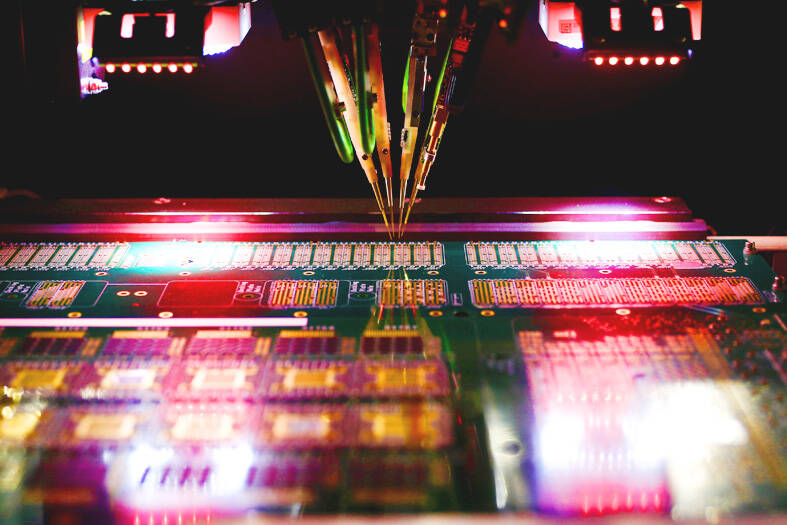An overwhelming majority of semiconductor executives expect revenue to grow this year, driven mainly by automotive applications that are putting wireless communications to the backseat, a survey released yesterday by global consultancy firm KPMG showed.
Eighty-one percent of respondents said that their company’s revenue would increase over the next year, and half of them said they expect growth of more than 10 percent, the survey of 151 global semiconductor executives last quarter showed.
Although lower than last year’s 95 percent and 68 percent respectively, the findings are encouraging in light of recent economic uncertainty, inflation, monetary tightening and geopolitical tensions, a KPMG report said.

Photo: Ritchie B. Tongo, EPA-EFE
Taiwan supplies 60 percent of the world’s chips used in smartphones, notebook computers, wearable devices, vehicles, and big data and Internet of Things applications.
KPMG’s Semiconductor Industry Confidence Index score is 56 for the upcoming 12 months, the report said, adding that a value above 50 suggests a more positive than negative outlook.
Sixty-four percent of executives forecast that the industry’s revenue will pick up this year, significantly lower than last year’s 97 percent, it said, citing the war in Ukraine as a contributor to the weaker growth projection.
About 40 percent said they were concerned the war would materially affect industry revenue prospects, higher than 25 percent a year earlier, it said.
For the first time, respondents rated the automotive industry as the most important segment driving company revenue over the next year, it said.
Automotive semiconductor revenue is expected to reach US$200 billion a year by the mid-2030s and surpass US$250 billion by 2040, KPMG had said earlier.
Wireless communications, long seen as the industry’s biggest revenue driver, slipped into second place from the previous year, it said.
Internet of Things, cloud computing and artificial intelligence ranked third, fourth and fifth in terms of importance respectively, the survey showed.
The “metaverse” as a segment, which appeared in the survey for the first time, ranked last out of 10 in importance for driving semiconductor revenue over the next year, it said.
The report said that executives might change their view in the coming years as metaverse technology evolves and adoption increases.
Sixty-five percent of respondents said they think a semiconductor supply shortage would ease this year, while 15 percent said they believe that supply and demand is already in balance for most products, and 20 percent said they think the shortage would continue into next year or later.
Regarding when executives expected the next semiconductor inventory glut to occur, 24 percent said they believe there is already excess inventory.
Securing talent is seen as the biggest issue facing the industry over the next three years, with 71 percent saying they would seek to increase their global workforce this year, it said.

CHIP RACE: Three years of overbroad export controls drove foreign competitors to pursue their own AI chips, and ‘cost US taxpayers billions of dollars,’ Nvidia said China has figured out the US strategy for allowing it to buy Nvidia Corp’s H200s and is rejecting the artificial intelligence (AI) chip in favor of domestically developed semiconductors, White House AI adviser David Sacks said, citing news reports. US President Donald Trump on Monday said that he would allow shipments of Nvidia’s H200 chips to China, part of an administration effort backed by Sacks to challenge Chinese tech champions such as Huawei Technologies Co (華為) by bringing US competition to their home market. On Friday, Sacks signaled that he was uncertain about whether that approach would work. “They’re rejecting our chips,” Sacks

NATIONAL SECURITY: Intel’s testing of ACM tools despite US government control ‘highlights egregious gaps in US technology protection policies,’ a former official said Chipmaker Intel Corp has tested chipmaking tools this year from a toolmaker with deep roots in China and two overseas units that were targeted by US sanctions, according to two sources with direct knowledge of the matter. Intel, which fended off calls for its CEO’s resignation from US President Donald Trump in August over his alleged ties to China, got the tools from ACM Research Inc, a Fremont, California-based producer of chipmaking equipment. Two of ACM’s units, based in Shanghai and South Korea, were among a number of firms barred last year from receiving US technology over claims they have

It is challenging to build infrastructure in much of Europe. Constrained budgets and polarized politics tend to undermine long-term projects, forcing officials to react to emergencies rather than plan for the future. Not in Austria. Today, the country is to officially open its Koralmbahn tunnel, the 5.9 billion euro (US$6.9 billion) centerpiece of a groundbreaking new railway that will eventually run from Poland’s Baltic coast to the Adriatic Sea, transforming travel within Austria and positioning the Alpine nation at the forefront of logistics in Europe. “It is Austria’s biggest socio-economic experiment in over a century,” said Eric Kirschner, an economist at Graz-based Joanneum

BUBBLE? Only a handful of companies are seeing rapid revenue growth and higher valuations, and it is not enough to call the AI trend a transformation, an analyst said Artificial intelligence (AI) is entering a more challenging phase next year as companies move beyond experimentation and begin demanding clear financial returns from a technology that has delivered big gains to only a small group of early adopters, PricewaterhouseCoopers (PwC) Taiwan said yesterday. Most organizations have been able to justify AI investments through cost recovery or modest efficiency gains, but few have achieved meaningful revenue growth or long-term competitive advantage, the consultancy said in its 2026 AI Business Predictions report. This growing performance gap is forcing executives to reconsider how AI is deployed across their organizations, it said. “Many companies